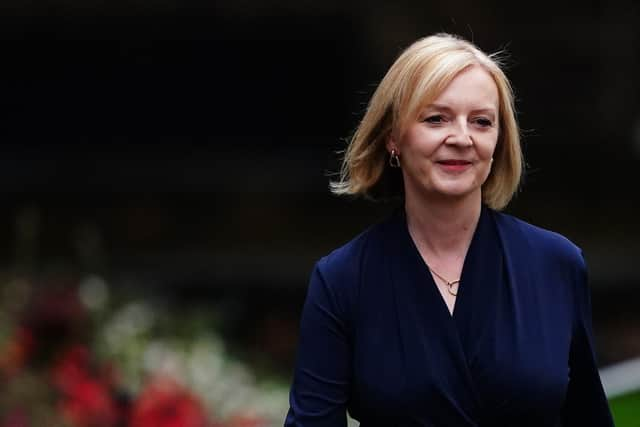Liz Truss: I want to work with Nicola Sturgeon
The Prime Minister said she would be keen to cooperate with Ms Sturgeon on growing the Scottish economy and energy generation like nuclear power.
But just minutes later Ms Sturgeon’s deputy John Swinney said the SNP had a longstanding aversion to nuclear power that would not be changing.
Advertisement
Hide AdAdvertisement
Hide AdSpeaking to BBC Scotland on Thursday after a tumultuous week for the British economy, the Prime Minister said: “What I want to do is work with Nicola Sturgeon to deal with our energy crisis and that’s about making sure we’re producing more homegrown energy – I’m keen to use more of the resources in the North Sea and also see more nuclear power stations built across the country, including in Scotland.


“I’m very keen to talk to Nicola Sturgeon about that because I think that will help us make sure we have long-term energy security that, alongside wind power in Scotland, we also have nuclear power in Scotland.”
When asked if she was playing into the hands of supporters of Scottish independence, the Prime Minister didn’t answer the question, saying instead: “I am very keen to work with Nicola Sturgeon to make sure we grow the Scottish economy.
“Scotland is a country that has fantastic entrepreneurs, fantastic exports, I believe that by improving infrastructure, by reducing taxes, we can really turbocharge the Scottish economy.”
The Prime Minister’s entreaties towards Ms Sturgeon come after she said during a Tory hustings event as she ran for leader of the party Ms Sturgeon was an “attention seeker” who should be ignored.
Within minutes of the interview being aired, Deputy First Minister John Swinney had rejected calls for more nuclear power in Scotland.
“We’ve always cooperated with UK governments … we are always happy to work with the UK Government, but there has to be an atmosphere of mutual respect, there has to be respect for devolution, which has been substantially eroded by the UK Government, particularly in the aftermath of Brexit through the internal market legislation,” he told BBC Radio Scotland’s Drivetime programme.
“There will be issues on which we are unable to agree, we take a different stance on nuclear power for example.”
Advertisement
Hide AdAdvertisement
Hide AdWhen the Prime Minister’s comments were put top him, the Deputy First Minister added: “We won’t sign up to that and we’ve made that very clear and it’s been a clear policy of the Scottish National Party government for 15 years and it’s not going to change.”
Mr Swinney went on to say he was not aware of plans for a meeting between the First Minister and Prime Minister, adding that Ms Sturgeon’s office had made a request for such a meeting.
“There was a commitment given by Boris Johnson to four nations discussions on the cost-of-living crisis – they haven’t happened yet and they get more and more urgent by the day,” he said, “because the cost-of-living crisis is being exacerbated by the foolish decisions taken by the UK Government on tax cuts, which are causing market instability, creating real difficulties in the housing market, increasing interest rates, weakening the pound and undermining the assets of people in the United Kingdom.”